
Everton's future direction under the ownership of Bill Kenwright was thrown into turmoil last night when the government rejected the club's controversial plan to construct a 50,000-seat stadium in Kirkby. The decision means Everton have now failed with three attempts to leave their historic Goodison Park home in the Premier League era.
The communities secretary, John Denham, had been expected to announce his decision by Friday and the reasons for the rejection, which came as a major surprise to local MPs and Everton officials, will be outlined in full this morning. George Howarth, the MP for the Knowsley North and Sefton East constituency, where the stadium was to be built, confirmed: "I deeply regret this decision in a time of significant economic challenge to the whole of Merseyside during a recession."
Everton's proposed £150m stadium was to be the centrepiece of a huge retail development in Kirkby, a scheme driven by the supermarket company Tesco whose chief executive, Sir Terry Leahy, is an Everton supporter and occasional adviser to the club. Denham is believed to have decided the negative impact of the retail development on surrounding areas, with neighbouring authorities Liverpool, St Helens and Sefton all objecting, outweighed the regeneration benefits for Kirkby.
The Destination Kirkby project has had a divisive effect since it was first announced and Kenwright, the chairman and majority shareholder, opened the decision to a vote of 36,662 Everton fans. The outcome in August 2007 was 15,230 in favour of the move, with 10,468 against and a further 10,901 abstaining.
Asked about the decision last night, Everton's manager, David Moyes, said: "I have nothing to say."
That vote followed claims from Everton's then chief executive, Keith Wyness, that Kirkby represented "the deal of the century" for a club that cannot currently afford a new stadium without an enabling project. It was also before details of the stadium where revealed and which, when published, prompted the leader of Liverpool City Council Warren Bradley to describe it as "A glorified cow shed built in a small town outside Liverpool." Ironically, Liverpool City Council are today due to submit their application to be considered a host city for the 2018 or 2022 World Cup, with the Kirkby stadium included in that proposal.
Wyness' claim in 2007 that Everton would be left with debt "that could be as low as £10m" for the £150m stadium - a calculation based on assistance from Tesco, the sale of Goodison Park and the sale of naming rights for Kirkby - has since been discredited. Everton were expecting to contribute around £75m should Kirkby have received the go-ahead and have nowhere near that figure at their disposal.
Club officials will not comment on the government's decision until details have been released but it is a major setback for Kenwright and the board of directors, who will now be under immensepressure to show they have a Plan B. The project to relocate outside the city of Liverpool boundary to Kirkby prompted the formation of the 'Keep Everton In Our City Campaign', whose reservations appear to be shared by the government.
A spokesman for KEIOC said: "This was never a boundary issue, it was a location issue. This stadium would have been nine miles outside the city centre, further from a city centre than any other Premier League ground. While we are pleased the stadium has been rejected, and we have been saying for three years that it goes against planning policy, we are not pleased that Everton have been left in a hole. The club has needed a new ground for over ten years and has been badly advised by so-called experts who, we believe, have been paid over £4m for this advice."

